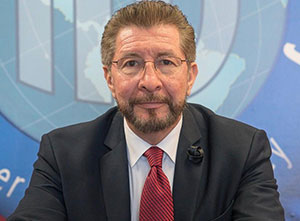To coexist and to negotiate with crime, are not an option for democracy

By: Carlos Sánchez Berzaín - 30/12/2023
Share:
It is clear that the main line of confrontation is dictatorship against democracy, with the express acknowledgement that dictatorships are organized crime’s systems that commit all sorts of crime to indefinitely take and wield power. The total control of government by criminal groups -as reality has shown in Cuba, Venezuela, Bolivia, and Nicaragua- results in an enabler of crime with an international scope on behalf of the States that organized crime controls. It is a profound crisis because to coexist and to negotiate with crime are not an option for democracy.
Democracy in the Americas is not a concept under discussion because its nature, and the essential elements that comprise it, are explicitly defined by a constitutive treaty, known as the Interamerican Democratic Charter (IDC), with binding and obligatory guidelines for all the region’s countries and citizens. That a law is transgressed does not invalidate either the IDC’s existence or its force, to the contrary it reveals the criminals and in the case of democracy, it clearly identifies those governments who are “non-democracies” and who are 21st Century Socialism’s dictatorships.
Article 1 of the Interamerican Democratic Charter mandates that “the peoples of the Americas have the right to democracy and their governments the obligation to promote and defend it. Democracy is essential for the social, economic, and political development of the peoples of the Americas.” Article 3 defines “the essential components of democracy.”
Twenty-First Century Socialism, or Castrochavism, in Cuba, Venezuela, Bolivia, and Nicaragua, do not meet any of the essential components of democracy and much to the contrary they violate them flagrantly and daily through the commission of crimes originating from the government. They attempt against human rights and basic individual freedoms, they have extinguished the rule of law that has been substituted by violent impositions, they have implanted “vote-catching dictatorships” because people vote but do not elect, doing this they have disappeared the universal and secret suffrage, they disguise the existence of a political plurality with a “functional opposition” and concentrate all power manipulating the Judicial as an instrument of repression and the legislature as the means for the creation of “despicable laws.”
The peoples, subjected by dictatorships, now endure a “state of helplessness,” oppressed by the way they are governed with “State-terrorism” defined as “the use of illegitimate methods, the commission of crimes by a government, aimed at instilling fear or terror in the civilian population to reach its objectives or accomplish behaviors that would otherwise not occur by themselves.” These are flagrant crimes that have been proven to occur under the dictatorships of Cuba, Venezuela, Bolivia, and Nicaragua with the existence of political prisoners, exiles, tortured, assassinated, persecuted, kidnapped, extorted, subjected, and a long list of national and foreign victims that are used as golden tokens of exchange in domestic and international negotiations.
Dictators and their inner circles commit crimes against humanity, transnational crimes, conspiracies, espionage, organize armed groups, are involved in narcotics’ trafficking, terrorism, attempts against life, human trafficking, slavery, all types of extortion, kidnappings, and crimes against international peace and security.
Twenty-First Century Socialism’s dictatorships are “a group of organized crime” defined by the United Nations Convention Against Transnational Organized Crime,” and Article 2a. of the Palermo Convention, that state “an Organized criminal group shall mean a structured group of three or more persons, existing for a period of time and acting in concert with the aim of committing one or more serious crimes or offences established in accordance with this Convention, in order to obtain, directly or indirectly, a financial or other material benefit.”
In the foreword of the Palermo Convention, then Secretary of the U.N. Koffi Annan reminded everyone that the fight against crime is an obligation and a worldwide necessity, expressing: “If the rule of law is undermined not only in one country, but in many, then those who defend it cannot limit themselves to purely national means. If the enemies of progress and human rights seek to exploit the openness and opportunities of globalization for their purposes, then we must exploit those very same factors to defend human rights and defeat the forces of crime, corruption, and trafficking in human beings.”
The fact that organized crime has political power and controls governments, does not change the judicial order and the values on which democracy is founded, to the contrary this demands urgent actions to return to normalcy and to guarantee the application of the law, ceasing and ending dictatorships.
Politics is the art of the possible and survival is the art of that which is necessary but, in order to prevail, democracy needs to respect its principles and values identifying and defeating organized crime with whom to coexist and to negotiate are not an option.
*Attorney & Political Scientist. Director of the Interamerican Institute for Democracy.
Translation from Spanish by Edgar L. Terrazas
«The opinions published herein are the sole responsibility of its author».